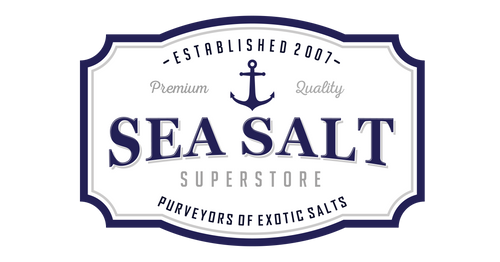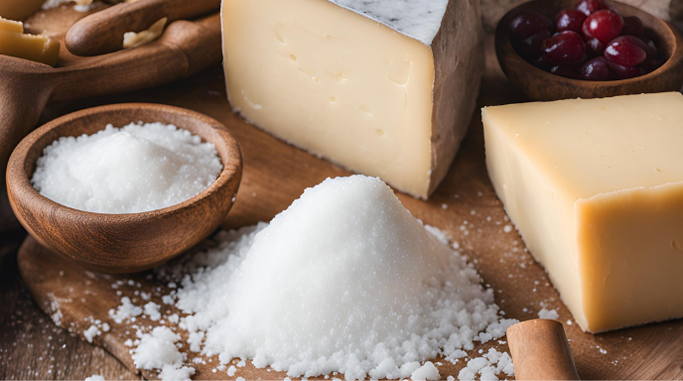Salt is not only a key ingredient in many foods, but it is also essential in the art of cheese making. Cheese making is a delicate process that involves various stages, from curdling milk to aging, and salt plays a vital role at nearly every stage. Whether you’re crafting a simple fresh cheese or a complex aged wheel, salt serves multiple functions that directly impact the flavor, texture, and shelf-life of the cheese. Here's why salt is so crucial in cheese making.
1. Flavor Enhancement
The most immediate effect of adding salt to cheese is its ability to enhance flavor. Salt balances out the inherent sourness or tanginess that comes from lactic acid produced during fermentation. It also highlights the natural flavors of the milk and the bacteria cultures used to make the cheese, helping to create a harmonious taste profile.
- Mild cheeses like mozzarella or ricotta may only require a light salting, often in a brine solution, to bring out their subtle flavors.
- Aged cheeses, such as cheddar or gouda, require more salt for a richer, more intense flavor. The longer the cheese ages, the more salt is needed to develop its robust taste.
In essence, salt helps achieve the right flavor balance, preventing cheese from becoming too bland or overly sour.
2. Texture and Moisture Control
Salt has a direct effect on the texture of cheese, particularly when it comes to moisture content. After curds are formed and whey is drained off, salt is added to help draw out excess moisture from the cheese. The salt causes the curds to firm up, contributing to a more solid and cohesive texture.
- In soft cheeses (e.g., brie or cream cheese), salt is usually added after the curd is formed but before it’s pressed or aged. This ensures a smooth, creamy texture without making the cheese too watery.
- In hard cheeses (like parmesan or aged cheddar), salt encourages the curd to expel more whey, leading to a denser, firmer texture that allows the cheese to age properly.
The moisture-reducing effect of salt also helps maintain the right consistency and aids in the preservation of the cheese.
3. Fermentation Control
Salt plays a key role in controlling the fermentation process during cheese making. By regulating the activity of the bacterial cultures that help acidify the milk, salt prevents them from becoming too active or too sluggish. The right level of salt ensures a steady fermentation rate and helps in creating a consistent product.
- During the early stages of cheese making, when the milk is curdled and the curds are formed, salt slows down the fermentation process slightly. This allows the curds to mature at a controlled pace and prevents excessive acidification, which can lead to undesirable flavors or textures.
- Salt also helps in preserving the delicate balance of microbes, encouraging the growth of beneficial bacteria while inhibiting the growth of spoilage bacteria or molds.
This balance is especially important in more delicate cheeses that require careful monitoring of the fermentation process.
4. Preservation and Shelf-Life
One of the most important functions of salt in cheese making is its role as a natural preservative. Salt helps to extend the shelf life of cheese by reducing moisture content, which prevents the growth of bacteria and molds that cause spoilage.
- Aging Cheeses: As cheeses age, the salt helps preserve their integrity by preventing microbial contamination. In hard cheeses, salt works by forming a natural rind and lowering the moisture content, which not only protects the interior but also allows the cheese to develop more complex flavors over time.
- Brining: Many cheeses, such as feta or mozzarella, are stored in brine, which serves as both a preservative and a flavor-enhancer. The brine solution prevents the cheese from spoiling and can even help develop its texture, especially in cheeses that are eaten fresh or after only short aging.
Without the preservative effect of salt, cheeses would spoil much more quickly and lose their desirable qualities. Salt, by creating an inhospitable environment for harmful bacteria, ensures that cheese can be safely stored and enjoyed for longer periods.
5. Cultural and Traditional Practices
Historically, salt has been essential to the cheese-making process, especially before refrigeration and modern preservation methods. In many traditional cheese-making regions, such as Italy, France, and Switzerland, salt is still an integral part of the process, contributing not only to the final product but also to the distinct characteristics of regional cheeses.
- Regional Cheeses: Each region has its own salt traditions, and this has led to the creation of iconic cheeses. For example, the use of sea salt in certain French cheeses, like camembert or roquefort, imparts specific flavors and textures that are a hallmark of the region.
- Artisanal Cheese Making: In smaller-scale, artisanal cheese production, the care and attention to detail in salting can dramatically influence the final product. Hand-salting or using natural sea salts can add a distinct nuance to the cheese that mass-produced cheeses may lack.
For many cheese makers, salt is more than a functional ingredient—it's part of their tradition and craft, passed down through generations.
6. Color Development
In some cases, salt helps to influence the appearance of cheese. While it’s not a universal effect, certain cheeses develop deeper or more appealing colors due to the presence of salt. For example, certain blue cheeses (like stilton or gorgonzola) may have a more pronounced color in part due to the interaction of salt with the molds used in the cheese. Similarly, salt can help bring out the natural yellow or orange color in cheeses like cheddar.
Conclusion
Salt is far more than just an enhancer of flavor in cheese making—it is a vital component that influences every step of the process. From controlling fermentation and regulating moisture to enhancing taste, improving texture, and extending shelf life, salt plays a multifaceted role in producing high-quality cheese. Whether it’s added directly to the curds or used in brine, salt helps create the ideal conditions for both the cheese and the cheesemaker, ensuring that the end result is flavorful, safe, and delicious. The next time you enjoy a wedge of your favorite cheese, remember that salt is not just a seasoning—it's a key ingredient that helps bring the magic of cheese to life.




